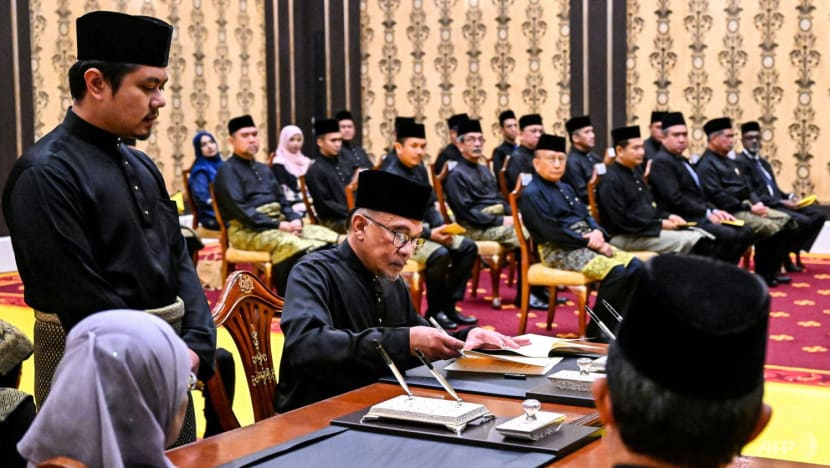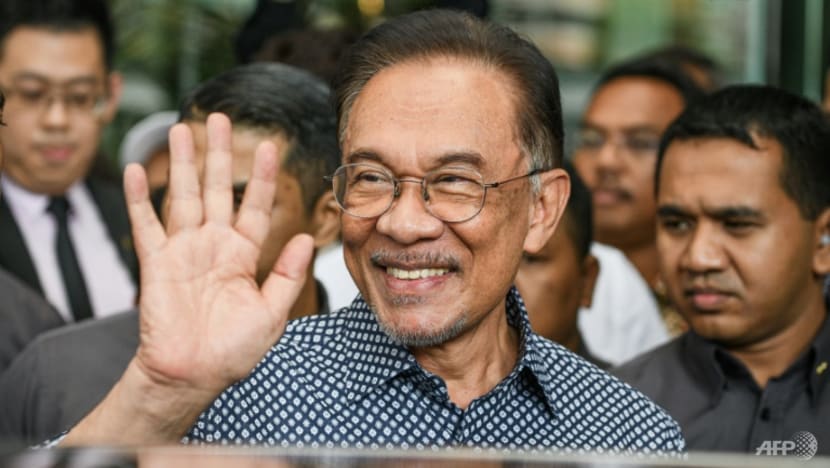 |
| Malaysia's newly appointed Prime Minister Anwar Ibrahim (centre) takes part in the swearing-in ceremony at the National Palace in Kuala Lumpur on Nov 24, 2022. (Photo: AFP/POOL/Mohd Rasfan) |
Norshahril Saat
01 Dec 2022
SINGAPORE: Within his first week of taking office, Malaysia’s new prime minister Anwar Ibrahim is already sending out good vibes that change in the country is under way. He must keep this momentum going, against all odds.
Anwar’s decision to not take his prime minister’s salary is a populist move. Granted, it is a campaign promise fulfilled. It will not tackle inequality and high rising prices in the country. But this symbolic move signals that he is sensitive to the struggles facing ordinary Malaysians.
In this age of social media and in the wake of recent corruption scandals, netizens scrutinise the smallest details of their leaders’ lifestyles, including the brands of their T-shirts, shoes, and even pens: The fact that Anwar used a cheap Artline black pen favoured by students at his swearing-in quickly went viral; the pen is selling out.
Netizens are quick to compare details like the prices of politicians’ clothes and any expressions of lavish lifestyles will not be well tolerated. Anwar must now convince his Cabinet colleagues and his party and family members to follow in his footsteps.
 |
| Anwar Ibrahim will become the country's fourth leader in as many years. (Photo: AFP/File/Mohd RASFAN) |
PROVING MAJORITY SUPPORT
Anwar’s decision not to draw a prime minister’s salary is in sync with his desire to trim the Cabinet. In March 2020, his Pakatan Harapan (PH) coalition criticised former prime minister Muhyiddin Yassin’s oversized 70-member Cabinet.
Now that PH cannot form the government without support from its opponents, Anwar must not dish out Cabinet positions to them in exchange for loyalty. He has pledged not to succumb to that practice, but several coalitions have indicated an interest in filling up one of the deputy prime minister’s positions.
Given this, Anwar may have to settle for an unprecedented two deputy prime ministers. In addition, Anwar must discontinue the practice of appointing Members of Parliament (MPs) to head government-linked companies.
Anwar is right in accepting a vote of confidence challenge when parliament sits on Dec 19. This is after his rival, Muhyiddin, claimed that he had majority support from MPs to form the government, even before the king appointed Anwar.
In his presentation to the palace, Muhyiddin attested to having 115 statutory declarations supporting his candidacy as prime minister. Anwar has said that the confidence motion will be the first item on parliament’s agenda. This is a noble thing to do, as the people can then openly witness their MPs’ support for the new prime minister.
After all, the country practices a system of constitutional, not absolute, monarchy. By contrast, when Muhyiddin was prime minister between March 2020 and August 2021, he repeatedly deflected calls for a confidence vote against him, raising doubts about his claims of a parliamentary majority.
Anwar has not belittled his opponents, Muhyiddin and Mahathir, after his appointment. Such personality attacks could have opened old wounds and invited counterattacks from them, which will distract him from resuscitating the economy, eradicating corruption, and implementing institutional reforms.
Mahathir, who was heavily defeated, has congratulated Anwar in a Facebook post. Mahathir has indicated that he wants to spend more time writing about history.
[History is written by the winners. Losers blog... Or if they have money, write history books.]
Could this be the moment when the longstanding roller-coaster relationship between the two leaders shifts to their being friends again? It should be noted that Malaysia’s economic reform agenda was at its most effective when the two were allies.
TREATING ALLIES AND OPPONENTS WITH EVEN-HANDEDNESS
While Anwar should not stoke personal rivalries, it does not mean that he should turn a blind eye to his potential allies’ alleged wrongdoings. Malaysians will closely watch whether Anwar fulfils his promise not to interfere with the judicial process.
This will include the ongoing court cases involving politicians suspected of corruption who are part of his unity government, such as United Malays National Organisation (UMNO) president Ahmad Zahid Hamidi, Malaysia United Democratic Alliance (MUDA) president Syed Saddiq, and former Democratic Action Party (DAP) secretary-general Lim Guan Eng.
Anwar must show even-handedness when dealing with those in his coalition, so that he would not be accused of going on a witch-hunt against only his opponents.
Anwar’s cobbling together of a unity government with a likely two-thirds majority is remarkable. Such a majority was the norm when Mahathir was prime minister (1981 to 2003). Abdullah Badawi could achieve this only in his first term (2003 to 2008).
Since then, no Malaysian government has achieved it. Had he agreed to collaborate with UMNO as PM for Pakatan Harapan (February 2018 to March 2020), Mahathir could have achieved it.
While the public can forgive Anwar’s working with UMNO now for the sake of national unity, his garnering of a two-thirds majority must not be celebrated as a true achievement but as a means to a larger end: Acquiring sufficient power to amend the constitution, to clean up the state apparatus and set the tone to clean up the country’s political culture.
Anwar has also started to court the civil service. On Nov 27, the heads of the civil service sacrificed their weekend to meet Anwar on a Sunday, which Anwar publicly acknowledged. Anwar must now win over the civil servants’ trust.
One way is to continue to fulfil the promises made by the previous government. These include increasing their allowances, transferring contract officers to permanent positions, and increasing military officers’ welfare benefits.
IMPROVING LEGITIMACY WITH CONSERVATIVE MUSLIM ELECTORATE
Anwar’s dilemma, however, is that his promise to the public to reduce the size of government and ministries might jeopardise civil servants’ rice bowls. Another hurdle is the trimming of oversized but politically sensitive bureaucracies such as the Department of Islamic Development Malaysia (JAKIM).
A considerable segment of Malay/Muslim voters lent their support to Perikatan Nasional (PN) because of its component party, now the largest party represented in parliament, Parti Islam SeMalaysia (PAS). For its part, PAS has staunchly refused to join Anwar’s coalition.
As Anwar seeks to improve his legitimacy with the Malay/Muslim electorate, cutting JAKIM down to size may create a strong backlash from the more conservative Malay/Muslims.
Anwar has made significant steps in a matter of days. His leadership is now key for the country to remain on course to reform and to heal the polarised nation. How he tackles the woes of the underclass, which is closely associated with Malay/Muslim voters, will likely define his premiership.
Anwar must tread carefully as these voters voted for his rival Muhyiddin in droves. He has already started addressing some difficult questions. Next up are even touchier issues regarding race and religious identity.
There is no doubt that Anwar has oratorical and public relations skills in abundance; the question is whether he can address the exclusivist religious and racial orientations disrespectful of Malaysia’s multicultural demography during his watch.
Norshahril Saat is Senior Fellow at the ISEAS – Yusof Ishak Institute and Coordinator at the Regional Social and Cultural Studies Programme. This commentary first appeared on the Institute’s blog, Fulcrum.
Source: Others/aj
No comments:
Post a Comment